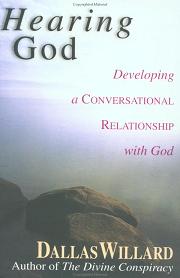Hearing God
 Dallas Willard’s Hearing God: Developing a Conversational Relationship With God is less a how-to book than a renovation of our commonly accepted ideas about prayer. Quietly but assuredly, it confronts the skepticism that God would speak regularly and understandably to his children. It meditates on the qualities of God’s voice and emphasizes the disciplines that give us (as Jesus called it) “ears to hear.” Above all it places prayer in the context of a life totally committed to walking with God, and growing in friendship with him:
Dallas Willard’s Hearing God: Developing a Conversational Relationship With God is less a how-to book than a renovation of our commonly accepted ideas about prayer. Quietly but assuredly, it confronts the skepticism that God would speak regularly and understandably to his children. It meditates on the qualities of God’s voice and emphasizes the disciplines that give us (as Jesus called it) “ears to hear.” Above all it places prayer in the context of a life totally committed to walking with God, and growing in friendship with him:
In our attempts to understand how God speaks to us and guides us, we must above all hold on to the fact that this is to be sought only as a part of a certain kind of life, a life of loving fellowship with the King and his other subjects within the kingdom of the heavens.
There is too much here to summarize. Suffice it to say I’ve found lots of opportunity to journal as I’ve read this book. Willard is a writer of such insight and substance that one could almost wish there were a little more fluff mixed in, to give me an opportunity to catch a mental breath. It’s not written in a particularly lively or flashy style, nor is it geared to impress. But the wisdom in these pages insists on careful, unhurried reading with lots of opportunity to pause and stare out the window. It’s fitting that each chapter ends with some questions for reflection.
Probably what I found most nourishing was the picture of “our communicating cosmos,” the title of chapter 4. For the Christian, the world is created and sustained by the Word of God, and the discussion of just what that means — and how it relates to our communication with God — spoke to a kind of despair I am often aware of in myself. I don’t want to live in a giant machine, but the world of modern conception is a mechanical one whether you look at technology, science, economics or corporate life. I loved being reminded that it’s God’s world and resembles a thought more than a machine. (Of course it’s elaborated so much better in the book…)
Even among Christians, we can adopt deterministic attitudes not only toward God’s purposes, but toward his way of interacting with us. Willard coins the term Bible Deism to describe the belief that God has spoken through his written word, and then, basically, left. Such a belief leaves us essentially on our own. Though Willard repeatedly affirms the importance of reading and meditating on the Bible (at one point he calls it “the permanent address at which the Word of God may be found”), he reminds us that the Bible itself is full of evidence that God speaks through other means as well.
Nowhere do we find a chatty or idolatrous God who can be made to speak on demand or give us our desires after the manner of a genie in a bottle. Willard reveals a much more stern and glorious picture of a loving God, close by and eager to maintain a cooperative relationship with us, ready to honor our choices along the way — for better or for worse:
We are hindered in our progress toward becoming spiritually competent people by how easily we can explain away the movements of God toward us. They go meekly, without much protest. Of course his day will come, but for now he cooperates with the desires and inclinations that make up our character, as we are gradually becoming the kind of people we will forever be. That should send a chill down our spine.


